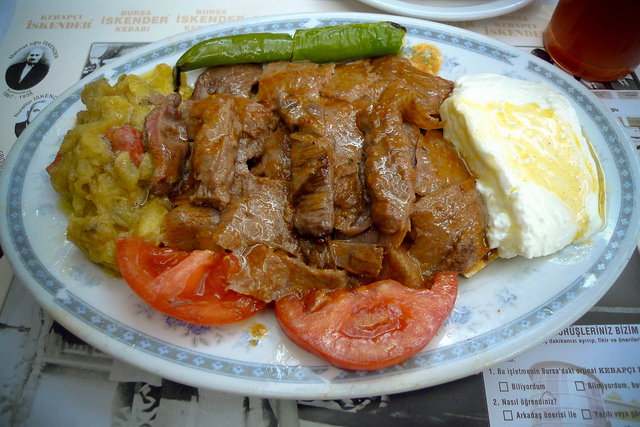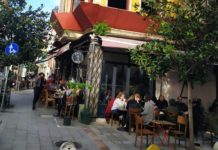
A friend of mine, whom I’ll call Gökhan, loves eating. It is one of his great passions in life. As the son of an industrialist, Gökhan grew up accustomed to the ways of the well-off, if not the rich. But his family some years ago fell on hard times (the father and his business partner went separate ways, the family business struggled).
When I first met Gökhan (he was my flatmate in Kadıköy), we would frequently either order in or go out for dinner. One of our favorite places was Bursa Iskender, a restaurant just off Bahariye Street that I highly recommend. It’s definitely a “where the locals eat” kind of place. The only strike I would put against it is that they don’t serve alcoholic drinks. But you can always go out for a drink after dinner, which Gökhan and I certainly and frequently did.
Back to Gökhan: I quickly noticed that, even though he was by then what you would classify as ex-rich, or a former rich kid, he had retained the habits and ways of his upbringing.
For instance, at restaurants he would keep our garson running all evening. He didn’t necessarily snap his fingers or bark harshly as to a servant. But he had what you would call an elegant brusqueness that proved very effective, a neat series of polite requests that would accompany each stage of the meal, from start to finish.
I must say, not having a strong command in Turkish in those days, I didn’t always follow the exact wording of Gökhan’s requests, but they always involved the waiter rushing off to the kitchen to bring back some ingredient, some side, that was absolutely essential if my friend could be reasonably expected to touch, let alone properly consume, his evening repast.
If you called Gökhan out, as I once did, he would respond with a shrug.
“When I eat,” he’d say, “I like to make those waiters work!”
Not that I ever noticed any of the waiters complain. Perhaps they appreciated the nature of his many requests.
For instance, when the salad was brought (Gökhan always insisted we have a large, fresh mixed salad with our dinner), it wasn’t long before he would call the garson back and ask that olive oil be brought.
The garson, nodding, would return momentarily with the bottle, which Gökhan would spread generously over the tomatoes, as one would spread maple syrup over pancakes.
“Dude, you cannot eat tomatoes without olive oil,” he explained, as though passing on an edict from the Turkish culinary gods. Who knows? Maybe the garson shared this opinion with equal conviction, thus he was not put out at all. Why, of course! Only a heathen would consider eating his tomatoes sans olive oil.
“I can eat this shit all day long,” Gökhan said, biting into a juicy, oiled-up tomato with a keen look of relish in his eyes.
Next, nearly always, came the request for red pepper. Gökhan would often insist on sprinkling red pepper on his dish, regardless of what it was. The garson, having just brought the olive oil, would nod and rush off, returning with a shaker of red pepper.
“Eyvallah,” my gourmand friend would say, gratefully, as though the garson had just saved him from drowning in a sea of blandness – what worse fate could an ex-aristocrat possibly endure?
Oh, and since the garson was still there, could he by chance bring bottles of Çamlıca sparkling water? Not still, mind you, and not just any garden variety sparkle. Had to be Çamlıca. I think, aside from its sweet-pop flavor, the red-and-white label nourished his sturdy, patriotic heart.
Along the day, there were numerous other small requests. More napkins, for instance. Or else the temperature of the klima needed to be slightly adjusted (“Dude, aren’t you cold? I’m cold!”), or an extra fork or clean plate.
By the arrival of the main course – we would often get the Iskender, or else Adana kebab – my friend was usually pacified, or focused enough on the food that the requests died down. Between mouthfuls, he would pontificate eloquently on the merits of the dish. Or he would share some tasty tidbit of local history.
Our meal concluded (“finished” seems not quite suitable; meals with Gökhan were always an event, after all), the garson, looking a bit winded, would take our plates.
“Eyvallah,” Gökhan would say, wiping his mouth. “Ellerinize sağlık.” Health to your hands. This, of course, is how Turks give their compliments to the chef. The garson would bow, with a polite nod to both of us. Again, I must say there was a certain dash, an offhand flourish, in how Gökhan carried himself in these moments. If I were to conduct myself in such a way, I don’t think I would be able to quite pull it off. It seems one must possess certain credentials, one of them being a vanished fortune – who knows?
He also had great style when the garson brought the bill (this was after we had Turkish coffee and smoked cigarettes).
Like all great gourmands of the world, particularly those of the ex-rich variety, Gökhan seldom had any money. His bank cards (he had several of them) would always seem to poop out at the most excruciatingly inconvenient times. His mother (damn her!) had forgotten (again) to send the money to top up his account. Could I float this one? He’d definitely get it next time.
“Sure,” I’d reply.
“Thanks, man. You’re aces!”
Gökhan had great knowledge of Turkish food, and the many places where it could be properly enjoyed. In the two years of our Istanbul friendship, there were always places he showed me. Even though I often ended up footing the bill, I nevertheless came away with a full belly and indebted to him for the tidbits he generously passed along.
For instance, one evening we were having pide at Damla, an old-fashioned pizzeria in Yeldeğirmeni, a neighborhood in Kadıköy.
“You’re in for a real treat,” Gökhan said. We watched the men putting in the pide and lahmacun into a brick oven with long wooden poles. “This place dates back many years. You don’t see many places like this around anymore.”
He was right. The results were cheap, home-style delicious. When the garson brought our lahmacun and pide, Gökhan was surprisingly undemanding. He only called the garson over maybe three or four times. In fact, the meal apparently put him in an especially mellow mood (he was always mellow, philosophical, after meals), for that evening he paid the bill himself.
—-
Eventually, my friend Gökhan moved to Kazakhstan. These days he scrapes by in Astana, writing term papers and essays for university students whose fathers are also industrialists and soon to be former industrialists. We still keep in touch. I must say, though, that I often think about our meals. When I’m out with my wife, inevitably his name will come up.
“Gökhan would never tolerate such undercooked vegetables,” we say to each other, for example.
“Absolutely not. Why, look at them. They’re a travesty!”
And we always insist on having olive oil with our tomatoes. Seriously, who in their right mind would think of touching, let alone consuming, tomatoes that had not been properly sanctified?
Yes, the ways of the rich, and especially the ex-rich, are mysterious, inscrutable. We all could learn from them. Exactly what is to be learned is open to interpretation. But if you have ambitions to join this elite class, then I encourage you to take note of all of the things that came from my dinner with Gökhan.
James Tressler is a writer and teacher. His books, including “Letters from Istanbul, Vols. 1 and 2,” and “City Scherzos: New Stories from Istanbul,” can be found at Lulu.com. He lives in Istanbul.











I enjoy all your work…but this one, this one is my favorite (until I read the next one).